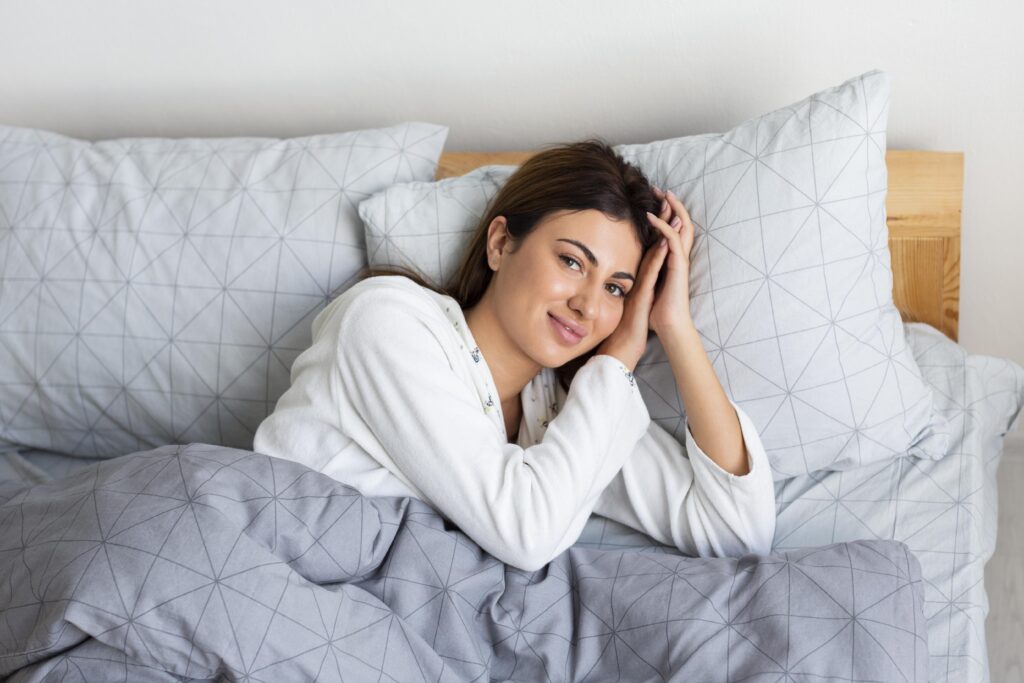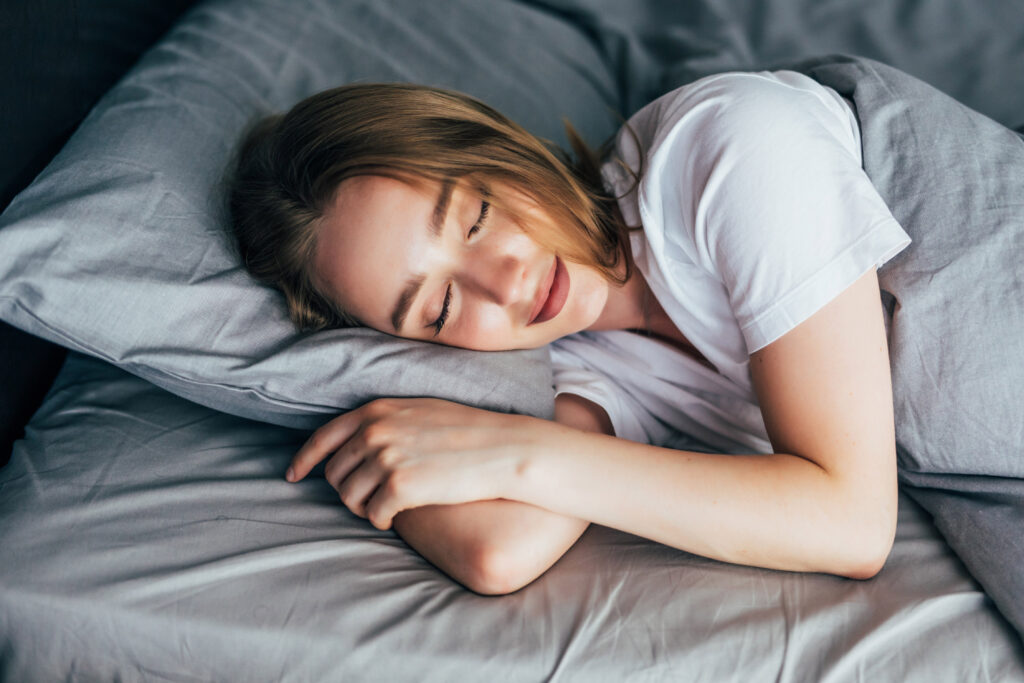
Sleep is important for overall health and well-being because it allows the body and mind to rest, repair, and function properly. Adequate sleep boosts immune function, improves memory and concentration, and regulates mood and stress levels. Prioritizing quality sleep is critical for maintaining physical, mental, and emotional balance in everyday life.
Changes in lifestyle improves quality of sleep by addressing factors that influence your body’s natural sleep-wake cycle. Simple changes, such as sticking to a consistent bedtime, developing a relaxing evening routine, and managing stress, can help regulate your circadian rhythm and promote deeper, more restful sleep.
Table of Contents
ToggleHere is the explanation of some good sleep habits that you must include in your daily life:
1. Establish a Consistent Sleep Schedule
Maintaining a consistent sleep schedule, which includes going to bed and waking up at the same time every day, is critical for improving sleep quality. This consistency helps to regulate your body’s internal clock, known as the circadian rhythm, which governs your sleep-wake cycles. Sticking to a routine allows your body to naturally know when to fall asleep and when to wake up, resulting in more restful nights and energized mornings. Even on weekends, it’s critical to stick to the same schedule to maintain this balance.
2. Create a Relaxing Bedtime Routine
Establishing a calming bedtime routine is critical for signaling to your body that it’s time to relax. Meditation, light reading, or taking a warm bath can all help relax the mind and body, resulting in better sleep. Avoid stimulating activities like watching TV, using your phone, or doing work-related tasks before bedtime because they keep your mind active and interfere with the natural process of falling asleep. A relaxing routine contributes to the ideal environment for restful sleep.
3. Optimize Your Sleep Environment
Creating the right environment is essential for good sleep. A dark, quiet, and cool room helps your body know it’s time to rest. Darkness promotes melatonin production, which aids in sleep, whereas a quiet environment reduces disruptions. Keeping the room cool helps regulate your body temperature, resulting in a more comfortable sleep. Consider using blackout curtains to block out light, a sound machine to drown out noise, or a sleep mask to keep the room dark all night long. These minor adjustments can make a significant difference in achieving restful sleep.

4. Limit Caffeine and Alcohol Intake
Caffeine and alcohol may significantly impact sleep patterns. Caffeine, a stimulant, inhibits the sleep-inducing chemical adenosine, making it more difficult to fall asleep. Alcohol, while it may make you feel drowsy at first, can disrupt deep sleep and cause frequent awakenings throughout the night. To improve sleep quality, limit caffeine and alcohol consumption, particularly in the afternoon and evening, as their effects can last for several hours.
5. Incorporate Regular Exercise
Regular exercise can significantly improve sleep quality. Physical activity reduces stress, regulates your body’s internal clock, and encourages deeper sleep cycles. Moderate exercise earlier in the day, such as walking, swimming, or yoga, can boost energy and help you sleep better at night. However, intense workouts close to bedtime should be avoided because they can raise adrenaline levels and make it difficult to sleep. Aim for at least 30 minutes of moderate exercise to promote restful, rejuvenating sleep.
6. Manage Stress and Anxiety
Stress and anxiety are common causes of sleep disturbances, making it difficult for the mind to rest at night. High stress levels can cause the release of hormones such as cortisol, disrupting the body’s natural sleep-wake cycle. Incorporating mindfulness practices such as yoga, meditation, or journaling before bed can help manage stress and improve sleep quality significantly. These activities promote relaxation and mental clarity, calming the mind, reducing anxiety, and preparing the body for restful sleep.
7. Monitor Your Diet
Eating large meals or sugary snacks before bedtime can disrupt your sleep by causing discomfort, indigestion, or energy spikes. Foods high in sugar or fat can cause restless sleep or difficulty falling asleep. Instead, choose light, nutritious snacks such as nuts, bananas, or yogurt. These foods contain nutrients like magnesium and tryptophan, which aid in relaxation and sleep quality. Keeping your evening meals light and balanced can help you relax and get a better night’s sleep.

8. Limit Screen Time Before Bed
The blue light emitted by screens on smartphones, tablets, and computers can significantly disrupt melatonin production, the hormone that regulates sleep. Blue light exposure in the evening can trick the brain into thinking it is still daytime, delaying sleep onset and reducing overall sleep quality. To combat this, limit your screen time at least an hour before bedtime, giving your body time to naturally produce melatonin and prepare for a good night’s sleep. Engaging in screen-free activities, such as reading a book or practicing relaxation techniques, can contribute to a more conducive sleeping environment.
9. Stay Hydrated, but Not Too Late
Staying hydrated throughout the day is critical for overall health because it helps maintain bodily functions, increases energy levels, and improves cognitive performance. Drinking plenty of water can also help digestion and regulate body temperature. However, it is critical to monitor fluid intake in the evening, as excessive drinking close to bedtime can result in frequent bathroom trips throughout the night, disrupting sleep. To achieve the right balance, drink enough fluids throughout the day while limiting intake in the hours leading up to bedtime to ensure uninterrupted, restful sleep.
10. Consult a Professional if Needed
If you’ve tried changing your lifestyle but are still having trouble sleeping, or if you suspect you have a sleep disorder like insomnia or sleep apnea, you should seek professional help. A healthcare provider can assess your symptoms, identify underlying issues, and recommend treatments or interventions that are specific to your needs. Remember that prioritizing your sleep is critical for overall health, and receiving the right support can lead to long-term improvements in your sleep quality and well-being.
Finally, simple lifestyle changes can have a significant impact on your sleep quality and overall health. Establishing a consistent sleep schedule, developing a relaxing bedtime routine, optimizing your sleep environment, and managing stress and diet can all lead to more restful nights. Remember that small changes can lead to significant improvements, so take the first step toward better sleep today. We invite you to share your experiences and any tips that have worked for you in the comments section below; your insights may help others on their journey to better sleep!
FAQS
Stress, anxiety, poor sleep hygiene, irregular sleep schedules, excessive screen time, and caffeine or alcohol consumption are among the most common causes.
Most adults require 7 to 9 hours of sleep per night to maintain good health and function.
Sleep hygiene refers to activities and behaviors that promote good quality sleep, such as sticking to a regular sleep schedule, providing a relaxing sleep environment, and avoiding stimulants before bedtime.
Yes, regular physical activity can assist to alleviate insomnia and enhance sleep quality. However, avoid strenuous exertion close to bedtime.
High levels of stress and anxiety can cause racing thoughts and an inability to relax, making it difficult to fall and remain asleep.